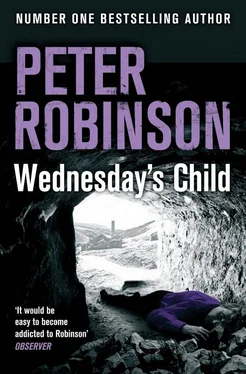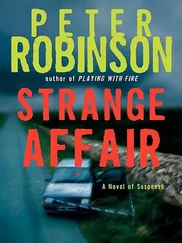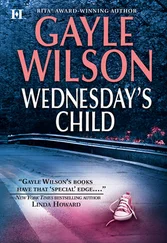Peter Robinson - Wednesday's Child
Здесь есть возможность читать онлайн «Peter Robinson - Wednesday's Child» весь текст электронной книги совершенно бесплатно (целиком полную версию без сокращений). В некоторых случаях можно слушать аудио, скачать через торрент в формате fb2 и присутствует краткое содержание. Год выпуска: 2006, ISBN: 2006, Издательство: Penguin Canada, Жанр: Полицейский детектив, на английском языке. Описание произведения, (предисловие) а так же отзывы посетителей доступны на портале библиотеки ЛибКат.
- Название:Wednesday's Child
- Автор:
- Издательство:Penguin Canada
- Жанр:
- Год:2006
- ISBN:978-0-14-305219-7
- Рейтинг книги:5 / 5. Голосов: 1
-
Избранное:Добавить в избранное
- Отзывы:
-
Ваша оценка:
- 100
- 1
- 2
- 3
- 4
- 5
Wednesday's Child: краткое содержание, описание и аннотация
Предлагаем к чтению аннотацию, описание, краткое содержание или предисловие (зависит от того, что написал сам автор книги «Wednesday's Child»). Если вы не нашли необходимую информацию о книге — напишите в комментариях, мы постараемся отыскать её.
Wednesday's Child — читать онлайн бесплатно полную книгу (весь текст) целиком
Ниже представлен текст книги, разбитый по страницам. Система сохранения места последней прочитанной страницы, позволяет с удобством читать онлайн бесплатно книгу «Wednesday's Child», без необходимости каждый раз заново искать на чём Вы остановились. Поставьте закладку, и сможете в любой момент перейти на страницу, на которой закончили чтение.
Интервал:
Закладка:
Peter Robinson
Wednesday's Child
For Sheila
“Lost in the desart wild
Is your little child.
How can Lyca sleep
If her mother weep?”
• • •
Sleeping Lyca lay
While the beasts of prey,
Come from caverns deep,
View’d the maid asleep.
William Blake
“The Little Girl Lost”ONE
I
The room was a tip, the woman a slattern. On the floor, near the door to the kitchen, a child’s doll with one eye missing lay naked on its back, right arm raised above its head. The carpet around it was so stained with ground-in mud and food, it was hard to tell what shade of brown it had been originally. High in one corner, by the front window, pale flowered wallpaper had peeled away from a damp patch. The windows were streaked with grime, and the flimsy orange curtains needed washing.
When Detective Chief Inspector Alan Banks perched at the edge of the scuffed olive-green armchair, he felt a spring dig into the back of his left thigh. He noticed Detective Constable Susan Gay turn up her nose as she looked at a garish oil-painting of Elvis Presley above the mantelpiece. “The King” was wearing a jewelled white cape with a high collar and held a microphone in his ringed hand.
In contrast to the shabby decor, a compact music centre in mint condition stood against one wall, a green-and-yellow budgie in a cage nonchalantly sharpened its bill on a cuttlefish, and an enormous matte black colour television blared out from one corner. “Blockbusters” was on, and Banks heard Bob Holness ask, “What ‘B’ is the name of an African country bordering on South Africa?”
“Could you turn the sound down, please, Mrs Scupham?” Banks asked the woman.
She looked at him blankly at first, as if she didn’t understand his request, then she walked over and turned off the TV altogether. “You can call me Brenda,” she said when she sat down again.
Banks took a closer look at her. In her late twenties, with long dirty-blonde hair showing dark roots, she possessed a kind of blowzy sexuality that hinted at concupiscent pleasure in bed. It was evident in the languor of her movements, the way she walked as if she were in a hot and humid climate.
She was a few pounds overweight, and her pink polo-neck sweater and black mini-skirt looked a size too small. Her full, pouty lips were liberally coated in scarlet lipstick, which matched her long, painted fingernails, and her vacuous, pale blue eyes, surrounded by matching eye-shadow, made Banks feel he had to repeat every question he asked.
Seeing the ashtray on the scratched coffee-table in front of him, Banks took out his cigarettes and offered the woman one. She accepted, leaning forward and holding back her hair with one hand as he lit it for her. She blew the smoke out through her nose, emulating some star she had seen in a film. He lit a cigarette himself, mostly to mask the peculiar smell, redolent of boiled cabbage and nail-polish remover, that permeated the room.
“When did you first get the feeling something was wrong?” he asked her.
She paused and frowned, then answered in a low voice, husky from too many cigarettes. “Just this afternoon. I phoned them, and they said they’d never heard of Mr Brown and Miss Peterson.”
“And you got worried?”
“Yes.”
“Why did you wait so long before checking up?”
Brenda paused to draw on her cigarette. “I don’t know,” she said. “I thought she’d be all right, you know…”
“But you could have called this morning. That’s when they said they’d bring her back, isn’t it?”
“Yes. I don’t know. I suppose so. I just… besides, I’d got things to do.”
“Did the visitors show you any identification?”
“They had cards, like, all official.”
“What did the cards say?”
Mrs Scupham turned her head to one side, showing only her profile. “I didn’t really get a good look. It all happened so fast.”
“Did the cards have photographs on them?”
“No, I don’t think so. I’m sure I would have noticed.”
“What exactly did they say to you?” Banks asked.
“They told me their names and said they was from the social, like, and then they showed their cards…”
“This was at the door, before you let them in?”
“Yes. And then they said they’d come to see me about my Gemma. Well, I had to let them in, didn’t I? They were from the authorities.”
Her voice cracked a little when she mentioned her daughter’s name, and she sucked her lower lip. Banks nodded. “What happened next?”
“When I let them in, they said they’d had reports of Gemma being… well, being abused…”
“Did they say where they’d heard this?”
She shook her head.
“Didn’t you ask them?”
“I didn’t think to. They seemed so… I mean, he was wearing a nice suit and his hair was all short and neatly brushed down, and she was dressed proper smart, too. They just seemed so sure of themselves. I didn’t think to ask anything.”
“Was there any truth in what they said?”
Mrs Scupham flushed. “Of course not. I love my Gemma. I wouldn’t harm her.”
“Go on,” Banks said. “What did they say next?”
“That’s about it really. They said they had to take her in, just overnight, for some tests and examinations, and if everything was all right they’d bring her back this morning, just like I told you on the phone. When they didn’t come, I got so worried… I… How could anyone do something like that, steal someone else’s child?”
Banks could see the tears forming in her eyes. He knew there was nothing he could say to console her. In fact, the best thing he could do was keep quiet about how bloody stupid she’d been, and not ask her if she hadn’t heard about the cases, just a few years ago, when bogus social workers had visited homes all around England with stories just like the one they’d given her. No, best keep quiet.
She had a fear of authority, probably bred into her, that meant she would believe just about anything that someone in a suit with a card, a nice haircut and an educated accent told her. She wasn’t unique in that. Most often, the phoney social workers had simply asked to examine the children in the home, not to remove them. For all the mothers who had sent them packing, Banks wondered how many had allowed the examination and had then been too afraid or ashamed to admit it.
“How old is Gemma?” Banks asked.
“Seven. Just seven.”
“Where’s your husband?”
Mrs Scupham crossed her legs and folded her hands on her lap. “I’m not married,” she said. “You might as well know. Well, there’s no shame in it these days, is there, what with so much divorce about.”
“What about Gemma’s father?”
“Terry?” She curled her upper lip in disgust. “He’s long gone.”
“Do you know where he is?”
Mrs Scupham shook her head. “He left when Gemma was three. I haven’t seen or heard from him since. And good riddance.”
“We need to contact him,” Banks pressed. “Can you give us any information at all that might help?”
“Why? You don’t… surely you don’t think Terry could have had anything to do with it?”
“We don’t think anything yet. At the very least he deserves to know what’s happened to his daughter.”
“I don’t see why. He never cared when he was around. Why should he care now?”
“Where is he, Brenda?”
“I’ve told you, I don’t know.”
“What’s his full name?”
“Garswood. Terry Garswood. Terence, I suppose, but everyone called him Terry.”
Читать дальшеИнтервал:
Закладка:
Похожие книги на «Wednesday's Child»
Представляем Вашему вниманию похожие книги на «Wednesday's Child» списком для выбора. Мы отобрали схожую по названию и смыслу литературу в надежде предоставить читателям больше вариантов отыскать новые, интересные, ещё непрочитанные произведения.
Обсуждение, отзывы о книге «Wednesday's Child» и просто собственные мнения читателей. Оставьте ваши комментарии, напишите, что Вы думаете о произведении, его смысле или главных героях. Укажите что конкретно понравилось, а что нет, и почему Вы так считаете.












